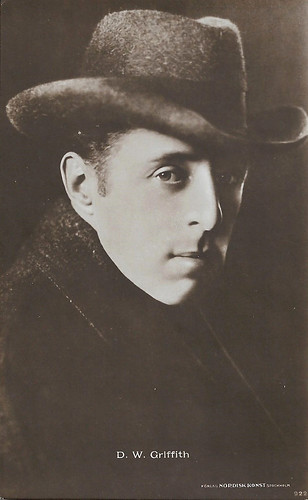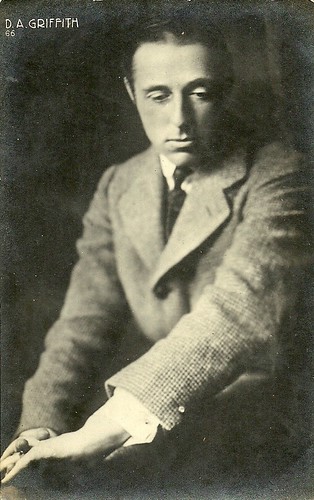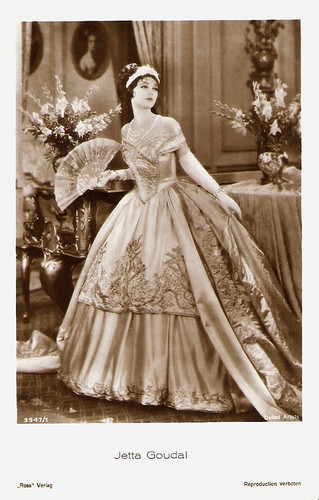Today, we start a new series on directors with a post on American pioneer David Wark Griffith (1875–1948). After shooting hundreds of shorts at Biograph, in which he experimented with cinematic techniques, Griffith made his mark with the silent classics The Birth of a Nation (1915) and Intolerance (1916). Both were acclaimed for their radical camera and narrative techniques, while the first has also been condemned for its inherently racist philosophy. Several of Griffith's later films were also successful, including Broken Blossoms (1919), Way Down East (1920), and Orphans of the Storm (1921), but his high costs for production, promotion, and roadshow often made his ventures commercial failures. Griffith was also one of the co-founders of United Artists and of AMPAS (Academy of Motion Pictures and Sciences).

Swedish postcard by Förlag Nordisk Konst, Stockholm, no. 922. A rare portrait of D.W. Griffith.

Spanish collectors card by Chocolate Amattler, series B, Artist no. 3, no. 10.

Vintage postcard, no. 66. Collection: Didier Hanson.
David Wark Griffith (1975-1948) has been called 'the father of film technique,' 'the man who invented Hollywood,' and 'the Shakespeare of the screen'. These qualifications may have been exaggerated, but still, Griffith is one of the greatest film directors ever.
Born in rural Kentucky to a former Confederate Army colonel and Civil War hero, young Griffith grew up with his father's romantic war stories and melodramatic nineteenth-century literature that were to eventually mould his black-and-white view of human existence and history.
In 1897 Griffith set out to pursue a career both acting and writing for the theatre, but for the most part, he was unsuccessful. Reluctantly, he agreed to work for the new motion picture medium for Edwin S. Porter at the Edison Company. He tried to sell a story to Edison, but they hired him as an actor instead.
Griffith was eventually offered a job at the financially struggling American Mutoscope & Biograph Co. In 1908, Biograph hired him as a first-time director when the chief director fell ill. His directorial debut was The Adventures of Dollie (1908). He stayed and directed over four hundred and fifty short films.
For American Mutoscope & Biograph Co., he produced and directed the first film ever made in Hollywood, In Old California (1910) and he also released his first feature, Judith of Bethulia (1913). He experimented with the story-telling techniques which he would perfect in his epic The Birth of a Nation (1915).

American postcard. Photo: Biograph. Bobby Harron's name is misspelled as Herron.
Robert 'Bobby' Harron (1893-1920) was a teenager when he acted in his first films. He soon appeared in the first films of D. W. Griffith and was to rub shoulders with the great silent stars of the time, notably Lillian Gish. He started to work for Biograph in 1907 and soon became Griffith's favorite, e.g. in In the Lonely Villa (D.W. Griffith, 1909), Bobby, the Coward (D.W. Griffith, 1911), and The Battle of Elderbush Gulch (D.W. Griffith, 1913). In 1912, Robert Harron appeared in nearly forty films at Biograph. Harron is probably best recalled for his roles in the three epic Griffith films: Judith of Bethulia (D.W. Griffith, 1914), opposite Blanche Sweet; the controversial The Birth of a Nation (D.W. Griffith, 1915) with an all-star cast; and the colossal epic Intolerance (D.W. Griffith, 1916). One of Harron's most popular roles was opposite Lillian Gish in the Griffith directed romantic film True Heart Susie (D.W. Griffith, 1919).

American postcard by Kraus Manufacturing Co., New York, 1913. Photo: Biograph.
American film actor Charles West (1885–1943) appeared in more than 300 films between 1908 and 1937. In 1908, West started to act with D.W. Griffith at Biograph, where he made hundreds of shorts, starting with The Christmas Burglars (D.W. Griffith, 1908), with Florence Lawrence. Being part of the Biograph 'stable' he did many supporting parts but also had leads, as in the Griffith films A Flash of Light (1910), The Broken Cross (1911), The Last Drop of Water (1911), The Blind Princess and the Poet (1911), etc., often being paired with Blanche Sweet. In 1913 he often starred opposite Sweet, Harry Carey and Claire McDowell, and by then direction at Biograph alternated between Griffith and Andy O'Sullivan. In the mid-1910s West remained with Harry Carey as part of the cast of his Westerns at Biograph. In 1916 he moved with Griffith to Triangle, e.g. in The Wood Nymph, produced and scripted by Griffith and starring new star Marie Doro. After a few films, Doro and he moved in 1916 to Jesse Lasky Pictures/ Paramount.

American postcard. Richard Barthelmess in Broken Blossoms (D. W. Griffith, 1919).
Richard Barthelmess (1895-1963) was an American film actor, known for the D.W. Griffith films Broken Blossoms (1919) and Way Down East (1920), and for Tol'able David (Henry King, 1921). He also got Academy Award nominations for The Patent Leather Kid (Alfred Santell, 1927) and The Noose (John Francis Dillon, 1928).

British postcard by Cinema Art, London. Photo: Lillian Gish and Richard Barthelmess in Way Down East (David Wark Griffith, 1920).
The rich, typified by the handsome man-about-town Lennox (Lowell Sherman), are exceptionally selfish and think only of their own pleasure. Anna (Lillian Gish) is a poor country girl whom Lennox tricks into a fake wedding. When she becomes pregnant, he leaves her. She has the baby, named Trust Lennox, on her own. When the baby dies she wanders until she gets a job with Squire Bartlett (Burr McIntosh). David (Richard Barthelmess), Squire Bartlett's son, falls for her, but she rejects him due to her past. Then Lennox shows up lusting for another local girl, Kate. Seeing Anna, he tries to get her to leave, but she refuses to go, although she promises to say nothing about his past. Finally, Squire Bartlett learns of Anna's past from Martha, the town gossip. In his anger, he tosses Anna out into a snowstorm. Before she goes, she fingers the respected Lennox as her despoiler and the father of her dead baby. Anna becomes lost in the raging storm while David leads a search party. In the famous climax, the unconscious Anna floats on an ice floe down a river towards a waterfall, until rescued at the last moment by David, who marries her in the final scene.

British postcard by Cinema Art, London. From left to right, the actors George Neville, Edgar Nelson, Burr McIntosh, Kate Bruce, Richard Barthelmess, Lillian Gish, Lowell Sherman, Vivia Ogden, Creighton Hale, Mary Hay, and Porter Strong.

Picture from an unknown magazine, stuck to cardboard card. Lillian Gish and Dorothy Gish in Orphans of the Storm (David Wark Griffith, 1921).
David Wark Griffith and his personal cinematographer G.W. 'Billy' Bitzer collaborated to create and perfect such cinematic devices as the flash-back, the iris shot, the mask and cross-cutting.
The immense popularity of The Birth of a Nation would set the stage for the dominance of the feature-length film in the United States. But after the release of this film, there were also riots in several black neighbourhoods across the country.
When he was criticised as being racist, D.W. Griffith was very hurt. He decided to make Intolerance: Love's Struggle Throughout the Ages (1916) as a follow-up, to show how damaging and dangerous people's intolerance can be.
In the years following The Birth of a Nation, Griffith never again saw the same monumental success as his signature film. Films like Broken Blossoms (1919), Way Down East (1920) and Orphans of the Storm (1921) were also successful, but his high production, promotional, and roadshow costs often made his ventures commercial failures.
In 1920, D.W. Griffith established United Artists with Charles Chaplin, Douglas Fairbanks, and Mary Pickford.
The film America (1924) is regarded as a major turning point in his career. Its failure ended his tenure as the industry's preeminent director. In 1931, his increasing failures forced his retirement. Griffith died in Los Angeles in 1948, one of the most dichotomous figures in film history.

German postcard by Ross Verlag, Berlin, no. 1810/1, 1927-1928. Photo: Fanamet. Adolphe Menjou in The Sorrows of Satan (D.W. Griffith, 1926).

German postcard by Ross Verlag, no. 1835/1, 1927-1928. Photo: Paramount / Fanamet. Ricardo Cortez in The Sorrows of Satan (D.W. Griffith, 1926).

German postcard by Ross Verlag, no. 3947/1, 1928-1929. Photo: United Artists. Jetta Goudal in Lady of the Pavements (D.W. Griffith, 1929).

German postcard by Ross Verlag, no. 4116/1, 1929-1930. Photo: United Artists. Lupe Velez in Lady of the Pavements (D.W. Griffith, 1929).

Belgian postcard. Photo Artistes Associés (United Artists). S.A. Cacao et Chocolat Kivou, Vilvoorde / N.V. Cacao en Chocolade Kivou, Vilvoorde. William Boyd in Lady of the Pavements (D.W. Griffith, 1929).
Sources: Michael Kaminsky (IMDb), Wikipedia, and IMDb.

Swedish postcard by Förlag Nordisk Konst, Stockholm, no. 922. A rare portrait of D.W. Griffith.

Spanish collectors card by Chocolate Amattler, series B, Artist no. 3, no. 10.

Vintage postcard, no. 66. Collection: Didier Hanson.
The man who invented Hollywood
David Wark Griffith (1975-1948) has been called 'the father of film technique,' 'the man who invented Hollywood,' and 'the Shakespeare of the screen'. These qualifications may have been exaggerated, but still, Griffith is one of the greatest film directors ever.
Born in rural Kentucky to a former Confederate Army colonel and Civil War hero, young Griffith grew up with his father's romantic war stories and melodramatic nineteenth-century literature that were to eventually mould his black-and-white view of human existence and history.
In 1897 Griffith set out to pursue a career both acting and writing for the theatre, but for the most part, he was unsuccessful. Reluctantly, he agreed to work for the new motion picture medium for Edwin S. Porter at the Edison Company. He tried to sell a story to Edison, but they hired him as an actor instead.
Griffith was eventually offered a job at the financially struggling American Mutoscope & Biograph Co. In 1908, Biograph hired him as a first-time director when the chief director fell ill. His directorial debut was The Adventures of Dollie (1908). He stayed and directed over four hundred and fifty short films.
For American Mutoscope & Biograph Co., he produced and directed the first film ever made in Hollywood, In Old California (1910) and he also released his first feature, Judith of Bethulia (1913). He experimented with the story-telling techniques which he would perfect in his epic The Birth of a Nation (1915).

American postcard. Photo: Biograph. Bobby Harron's name is misspelled as Herron.
Robert 'Bobby' Harron (1893-1920) was a teenager when he acted in his first films. He soon appeared in the first films of D. W. Griffith and was to rub shoulders with the great silent stars of the time, notably Lillian Gish. He started to work for Biograph in 1907 and soon became Griffith's favorite, e.g. in In the Lonely Villa (D.W. Griffith, 1909), Bobby, the Coward (D.W. Griffith, 1911), and The Battle of Elderbush Gulch (D.W. Griffith, 1913). In 1912, Robert Harron appeared in nearly forty films at Biograph. Harron is probably best recalled for his roles in the three epic Griffith films: Judith of Bethulia (D.W. Griffith, 1914), opposite Blanche Sweet; the controversial The Birth of a Nation (D.W. Griffith, 1915) with an all-star cast; and the colossal epic Intolerance (D.W. Griffith, 1916). One of Harron's most popular roles was opposite Lillian Gish in the Griffith directed romantic film True Heart Susie (D.W. Griffith, 1919).

American postcard by Kraus Manufacturing Co., New York, 1913. Photo: Biograph.
American film actor Charles West (1885–1943) appeared in more than 300 films between 1908 and 1937. In 1908, West started to act with D.W. Griffith at Biograph, where he made hundreds of shorts, starting with The Christmas Burglars (D.W. Griffith, 1908), with Florence Lawrence. Being part of the Biograph 'stable' he did many supporting parts but also had leads, as in the Griffith films A Flash of Light (1910), The Broken Cross (1911), The Last Drop of Water (1911), The Blind Princess and the Poet (1911), etc., often being paired with Blanche Sweet. In 1913 he often starred opposite Sweet, Harry Carey and Claire McDowell, and by then direction at Biograph alternated between Griffith and Andy O'Sullivan. In the mid-1910s West remained with Harry Carey as part of the cast of his Westerns at Biograph. In 1916 he moved with Griffith to Triangle, e.g. in The Wood Nymph, produced and scripted by Griffith and starring new star Marie Doro. After a few films, Doro and he moved in 1916 to Jesse Lasky Pictures/ Paramount.

American postcard. Richard Barthelmess in Broken Blossoms (D. W. Griffith, 1919).
Richard Barthelmess (1895-1963) was an American film actor, known for the D.W. Griffith films Broken Blossoms (1919) and Way Down East (1920), and for Tol'able David (Henry King, 1921). He also got Academy Award nominations for The Patent Leather Kid (Alfred Santell, 1927) and The Noose (John Francis Dillon, 1928).

British postcard by Cinema Art, London. Photo: Lillian Gish and Richard Barthelmess in Way Down East (David Wark Griffith, 1920).
The rich, typified by the handsome man-about-town Lennox (Lowell Sherman), are exceptionally selfish and think only of their own pleasure. Anna (Lillian Gish) is a poor country girl whom Lennox tricks into a fake wedding. When she becomes pregnant, he leaves her. She has the baby, named Trust Lennox, on her own. When the baby dies she wanders until she gets a job with Squire Bartlett (Burr McIntosh). David (Richard Barthelmess), Squire Bartlett's son, falls for her, but she rejects him due to her past. Then Lennox shows up lusting for another local girl, Kate. Seeing Anna, he tries to get her to leave, but she refuses to go, although she promises to say nothing about his past. Finally, Squire Bartlett learns of Anna's past from Martha, the town gossip. In his anger, he tosses Anna out into a snowstorm. Before she goes, she fingers the respected Lennox as her despoiler and the father of her dead baby. Anna becomes lost in the raging storm while David leads a search party. In the famous climax, the unconscious Anna floats on an ice floe down a river towards a waterfall, until rescued at the last moment by David, who marries her in the final scene.

British postcard by Cinema Art, London. From left to right, the actors George Neville, Edgar Nelson, Burr McIntosh, Kate Bruce, Richard Barthelmess, Lillian Gish, Lowell Sherman, Vivia Ogden, Creighton Hale, Mary Hay, and Porter Strong.

Picture from an unknown magazine, stuck to cardboard card. Lillian Gish and Dorothy Gish in Orphans of the Storm (David Wark Griffith, 1921).
The creator of the flash-back, the iris shot, the mask and cross-cutting
David Wark Griffith and his personal cinematographer G.W. 'Billy' Bitzer collaborated to create and perfect such cinematic devices as the flash-back, the iris shot, the mask and cross-cutting.
The immense popularity of The Birth of a Nation would set the stage for the dominance of the feature-length film in the United States. But after the release of this film, there were also riots in several black neighbourhoods across the country.
When he was criticised as being racist, D.W. Griffith was very hurt. He decided to make Intolerance: Love's Struggle Throughout the Ages (1916) as a follow-up, to show how damaging and dangerous people's intolerance can be.
In the years following The Birth of a Nation, Griffith never again saw the same monumental success as his signature film. Films like Broken Blossoms (1919), Way Down East (1920) and Orphans of the Storm (1921) were also successful, but his high production, promotional, and roadshow costs often made his ventures commercial failures.
In 1920, D.W. Griffith established United Artists with Charles Chaplin, Douglas Fairbanks, and Mary Pickford.
The film America (1924) is regarded as a major turning point in his career. Its failure ended his tenure as the industry's preeminent director. In 1931, his increasing failures forced his retirement. Griffith died in Los Angeles in 1948, one of the most dichotomous figures in film history.

German postcard by Ross Verlag, Berlin, no. 1810/1, 1927-1928. Photo: Fanamet. Adolphe Menjou in The Sorrows of Satan (D.W. Griffith, 1926).

German postcard by Ross Verlag, no. 1835/1, 1927-1928. Photo: Paramount / Fanamet. Ricardo Cortez in The Sorrows of Satan (D.W. Griffith, 1926).

German postcard by Ross Verlag, no. 3947/1, 1928-1929. Photo: United Artists. Jetta Goudal in Lady of the Pavements (D.W. Griffith, 1929).

German postcard by Ross Verlag, no. 4116/1, 1929-1930. Photo: United Artists. Lupe Velez in Lady of the Pavements (D.W. Griffith, 1929).

Belgian postcard. Photo Artistes Associés (United Artists). S.A. Cacao et Chocolat Kivou, Vilvoorde / N.V. Cacao en Chocolade Kivou, Vilvoorde. William Boyd in Lady of the Pavements (D.W. Griffith, 1929).
Sources: Michael Kaminsky (IMDb), Wikipedia, and IMDb.
No comments:
Post a Comment